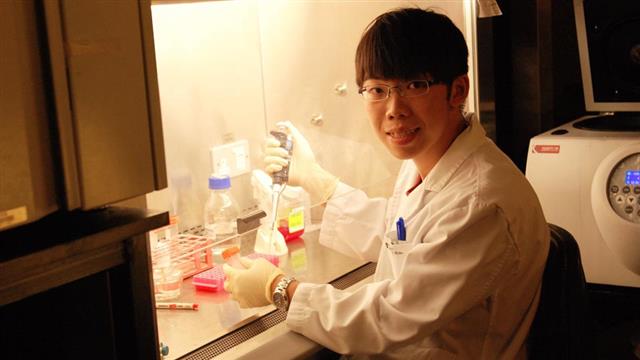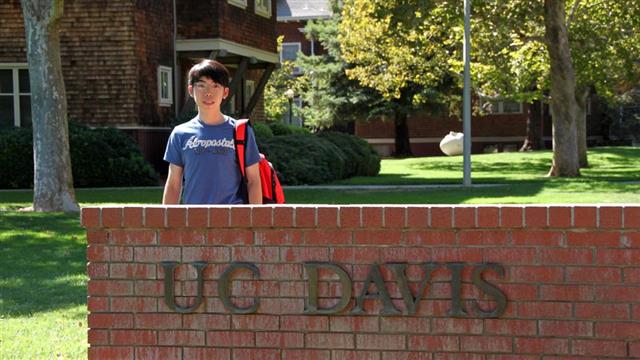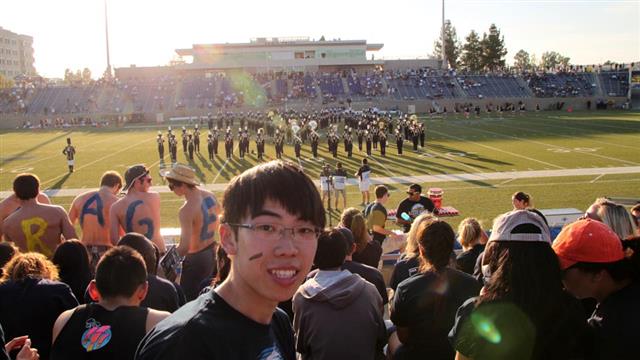Cell and Molecular Biology student, Tom Tam, has suffered from severe hearing loss in both ears since birth. However, with perseverance, support from the University and the help of loving teachers, he managed to overcome this inborn defect. Tom graduated with first-class honours and won the Sir Edward Youde Overseas Scholarship. This September, he will pursue doctoral studies in environmental toxicology at the University of California, Riverside, to fulfil his dream of being a scientist.
When Tom was two, his mother noticed that he did not respond to thunder or planes flying overhead. She took him to the doctor who diagnosed Tom with profound hearing loss in both ears. From then on, Tom started learning pronunciation at a centre for the deaf, and enrolled in a mainstream primary and secondary school. With the help of a hearing aid and lip-reading, Tom can now talk slowly and communicate with others well although he still can't pronounce certain words correctly.
'When I was in primary school, I didn't know what teacher was saying during lessons and my parents had to teach me again at home. I spent nearly twice as much time doing homework as my classmates.' Tom then received cochlear implantation surgery in one ear and wore a hearing aid in another. He also learnt to lip-read. His academic performance improved gradually as he prepared diligently for lessons and asked questions zealously after class. In 2010, outstanding A-levels results got Tom into CUHK where he majored in Cell and Molecular Biology.
Tom said the University was extremely supportive of his studies. If there was video broadcast during lessons, it would be subtitled to ensure that he could understand the content. The Office of Student Affairs also lent him a FM transmitter aka FM mic, that he could give to teachers to wear during lessons so their voices would be amplified through the FM system in the classrooms.
Besides studying, Tom sought out opportunities to broaden his horizons. In Year 3, he went on exchange for a year at the University of California Davis where he found a diverse range of support for the deaf. He was assigned an assistant to input what the professor taught word by word into the computer so that he could read what was being said immediately on a monitor. There were also students taking notes for him. 'If I take notes, I won't be able to read the teachers' lips. But if somebody's doing it for me, I can focus on lip reading.' With these services, Tom made tremendous improvements in his academic performance, which encouraged him to take courses in new disciplines such as astronomy.
During the year of exchange, Tom realized that with the right support, the hearing impaired could make progress. After returning to Hong Kong, he proposed to the University to put in place the new services he had encountered at UC Davis. The Office of Student Affairs quickly coordinated with the relevant teaching departments to recruit volunteer students to work as note-takers for Tom. This made learning much easier for him.
Tom is grateful for having met many devoted teachers who gave him guidance. To prepare for the IELTS, the English test that students applying for overseas exchange have to take, Tom enrolled in a preparation workshop offered by the English Language Teaching Unit. Miranda Lee, an assistant lecturer of the unit who taught him, was impressed by his eagerness to learn. She said Tom always sent e-mails to ask her questions, did exercises and sought her comments on them. Now the two are friends.
Prof. Fong Wing-ping was Tom's teacher on the course 'Proteins and Enzymes'. In his eyes, Tom is 'diligent and always punctual'. He highly commended Tom on his attitude to learning. 'Tom is thirsty for knowledge. He would ask if he didn't understand and would clarify if he was in doubt. He kept on sending me questions via e-mail every week. I distributed a mock exam paper to the whole class, and he was among a few who actually finished it and asked for advice on performance. '
Although Tom's path has been strewn with obstacles, he saw them as challenges and has succeeded in overcoming them. He has a few words of encouragement for those in a disadvantaged position: 'Wallowing in self-pity won't do you any good. Don't keep thinking that you are the most unfortunate. Never give up. Practice really does make perfect.'





